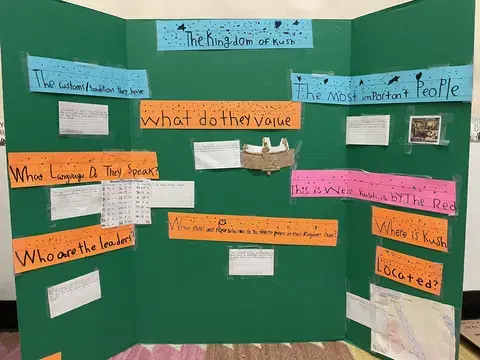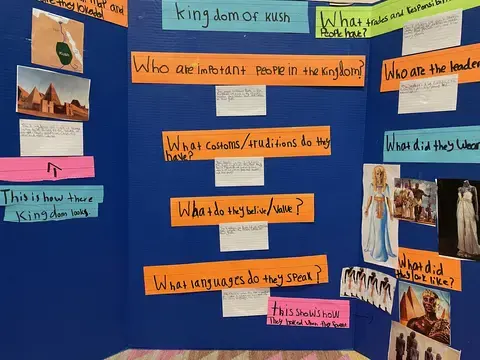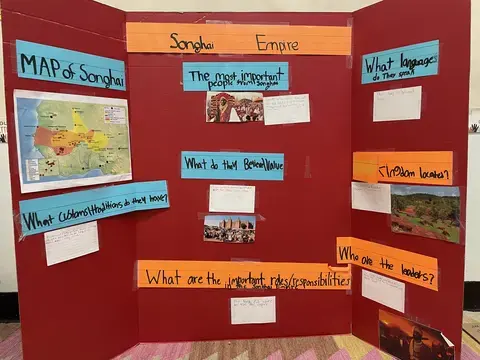This unit was created by the Bronx School for the Arts team as part of the 2022 cohort of The 1619 Project Education Network. It is designed for facilitation across approximately 5-7 weeks, with 45-minute lessons scheduled 3 times per week.
Objectives:
Students will...
- Describe and explain the customs, beliefs, values, languages, structure, and governance of a community
- Compare and contrast characteristics between different types of communities, including kingdoms in Africa before 1619
- Evaluate how the legacy of resistance continues in current social movements
Unit Overview:
Our project focuses on the creation of communities. Our elementary-level study of community focuses on defining what a community is and exploring different types of communities. This unit will expand on our learning by exploring why and how people create communities. Using the text Born on the Water, we will explore how communities have formed throughout history.
Students will understand that complex societies and civilizations persevere by adapting to and modifying their environments. Students will discover the common characteristics of communities, applying their learning to analyze the history of African people who were captured, brought to the Americas through the Middle Passage, and enslaved. As a result of being taken forcibly from their homes and families, the African people had to create their own community to survive - a new community “born on the water.” They were the people “who refused to die.” They created a legacy of resistance to brutality and oppression, a legacy that continued throughout history and lives on today.
Throughout our reading and discussion of Born on the Water, we will explore the following questions:
- What is a community? What does our community look like?
- How does geography affect different communities? What are some defining characteristics of particular communities?
- What is a kingdom? What were some defining characteristics of the Kingdom of Ndongo?
- How was the Kingdom of Ndongo similar and different to our community?
- What were some defining characteristics of other African kingdoms?
- What does it mean when something is stolen? What feelings does it evoke? Can a culture be stolen? Can people be stolen? Can a community be stolen? When do people create new communities?
- What does it mean to resist something? What feelings does it evoke?
- Who are some people who have resisted unfair, oppressive conditions and/or laws? How have they contributed to the legacy of resistance?
Performance Task(s):
African Kingdom Research Project:
Students will work in groups to research a kingdom in Africa and create a presentation board detailing the following:
- Customs
- Beliefs
- Values
- Languages
- Patterns of organization (structure)
- Governance
Legacy Project:
Students will choose a current or historical figure who has continued (or currently continues) a legacy of resistance against oppression. Students will create an individual written or oral presentation (including, but not limited to: videos, posters, Google slides, essays, etc).
12 lesson plans, including pacing, texts, worksheets, and additional teaching materials. Download below, and scroll down to review key resources included in the unit plan.
Unit Resources
| 1619 Project Resources | Born on the Water by Nikole Hannah-Jones and Renee Watson |
| Additional Resources | Timelines From Black History: Leaders, Legends, Legacies from the DK Big Ideas Series, Penguin Random House The Black History Book from the DK Big Ideas Series, Penguin Random House Njinga of Ndongo and Matamba by Ekiuwa Aire and Natalia Popova Njinga of Ndongo and Matamba - Unit of Study from Our Ancestors The West Central Africans, part 4 from PBS Learning Media Ashanti to Zulu: African Traditions by Margaret Musgrove “Overview of the slave trade out of Africa” by David Eltis and David Richardson from Slave Voyages: The Trans-Atlantic Slave Trade Database |
New York Social Studies Standards
5.1 The first humans in the Western Hemisphere modified their physical environment as well as adapted to their environment. Their interactions with their environment led to various innovations and to the development of unique cultures.
5.3 Various European powers explored and eventually colonized the Western Hemisphere. This had a profound effect on Native Americans and led to the transatlantic slave trade.
In this unit, students demonstrated mastery and engagement through a series of formative and summative tasks. Below are a few examples of student work.
African Civilization Task:
Students worked in groups to research a kingdom in Africa and present the characteristics of the community:



Born on the Water Exit Ticket:
The Ndongo people lost their homes...families and belongings but they [met] strangers from different kingdoms. They were together and they refused to die.”
5TH GRADER, BRONX CHARTER FOR THE ARTS
After exploring Born on the Water by Nikole Hannah-Jones and Renée Watson as a class, students completed independent reflections on meaning of being "born on the water." Review the range of student responses in the PDF below.
Legacy Project:
Students developed presentations on a current or historical figure who continued (or continues) a legacy of resistance against oppression.
